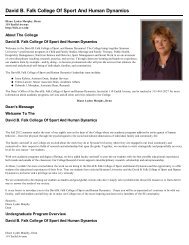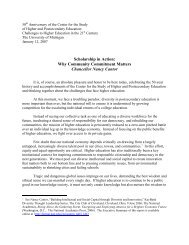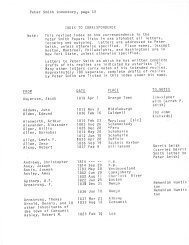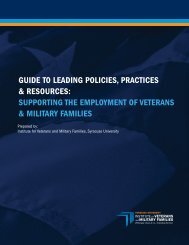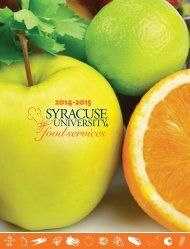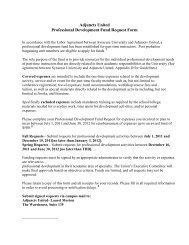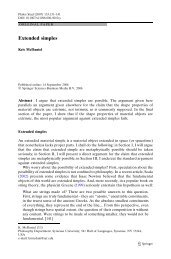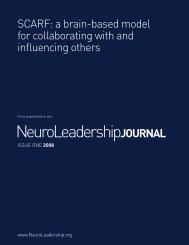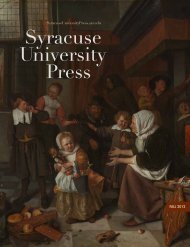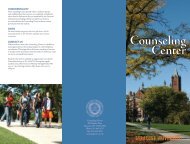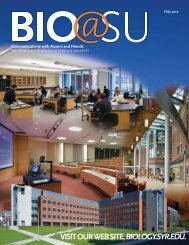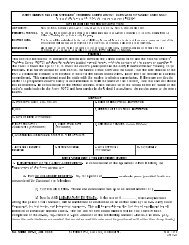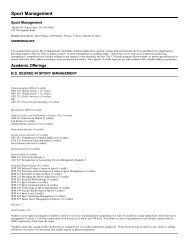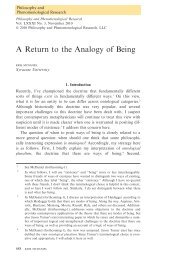Fall 2011 - the Department of Biology - Syracuse University
Fall 2011 - the Department of Biology - Syracuse University
Fall 2011 - the Department of Biology - Syracuse University
- No tags were found...
Create successful ePaper yourself
Turn your PDF publications into a flip-book with our unique Google optimized e-Paper software.
<strong>Biology</strong> 123 students dissecting fetal pigs in <strong>the</strong> “Druger Laboratory” named in honor <strong>of</strong> Marvin Druger.Lewis, and Ph.D. candidate Nicole Jacobs-McDaniels (pr<strong>of</strong>iledin <strong>the</strong> last issue <strong>of</strong> BIO@SU), who designed <strong>the</strong>se exercises tocomplement <strong>the</strong> 123/124 curriculum. Students observe zebrafish embryos in various stages <strong>of</strong> development and comparedifferences between <strong>the</strong> emerging structures in “wild type” fishversus those with a particular mutation. Using techniques likegel electrophoresis with DNA samples from <strong>the</strong> fish, studentsalso “see” <strong>the</strong> genetics responsible for <strong>the</strong> observed phenotypes.Through <strong>the</strong>se types <strong>of</strong> experiences, not only do our studentslearn about foundational concepts <strong>of</strong> biology, but <strong>the</strong>y alsolearn about current techniques and build skills that will helpequip <strong>the</strong>m to engage in independent research with our facultymembers.Aside from <strong>the</strong> content <strong>of</strong> <strong>the</strong> course, <strong>the</strong> new laboratoriesand enhanced teaching space and facilities have made it possibleto make additions and changes to how <strong>the</strong> course is taught. Forone, TAs are much more connected to what’s going on in <strong>the</strong>labs. Whereas TAs once checked-out audio-tutorial CDs or tapesto students who may have been assigned to any <strong>of</strong> <strong>the</strong> o<strong>the</strong>rTAs for recitation, our TAs now circulate among <strong>the</strong> studentteams actively engaging <strong>the</strong>m throughout <strong>the</strong> period. Also,now even <strong>the</strong> teaching assistants have assistants. Upper-levelundergraduates who have been successful in <strong>the</strong> introductorycourses are invited to enroll in <strong>Biology</strong> 360 as biology laboratoryassistants. These budding biologists serve as peer mentors forour freshmen, and <strong>the</strong>y are a tremendous help to <strong>the</strong> TAs––answering questions from <strong>the</strong>ir mentees, maintaining stocksolutions and o<strong>the</strong>r supplies, serving as ano<strong>the</strong>r set <strong>of</strong> safetymindedeyes, and getting a great review <strong>of</strong> general biology in<strong>the</strong> process. Historically, graduate TAs had been assigned torecitation periods at various times in <strong>the</strong> week, separate from <strong>the</strong>tape labs and hands-on laboratory work. The recitation sessionhas now been incorporated into <strong>the</strong> lab block. This provides agreat deal <strong>of</strong> flexibility as TAs can run recitations before, during,or after <strong>the</strong> laboratory according to <strong>the</strong> nature <strong>of</strong> <strong>the</strong> week’sprocedures.Ano<strong>the</strong>r way we have been introducing undergraduates toresearch in <strong>the</strong> life sciences is through new iterations <strong>of</strong> <strong>Biology</strong>200: Selected Topics. As in <strong>the</strong> past, teaching assistants <strong>of</strong>fersections <strong>of</strong> this course with topics <strong>of</strong> particular interest to <strong>the</strong>m.Recent TA-led titles include pathophysiology, medical ecology,and biotechnology and bioethics. In addition, a new title under<strong>the</strong> BIO 200 banner, Introduction to <strong>Biology</strong> Research at<strong>Syracuse</strong>, is <strong>of</strong>fered as a way to introduce promising freshmento <strong>the</strong> ongoing investigations <strong>of</strong> our faculty in <strong>the</strong> life sciences.Students who have successfully completed <strong>Biology</strong> 121 and whoare interested in careers as scientists are invited to enroll inthis course in which <strong>the</strong>y read and produce written responsesto our faculty members’ primary research articles, are treatedto technical presentations from those faculty members and/orpostdocs and graduate students, engage in related discussion,and compose reviews <strong>of</strong> <strong>the</strong> literature around a topic <strong>of</strong> scientificinquiry. One <strong>of</strong> <strong>the</strong> main goals <strong>of</strong> <strong>the</strong> course is to steer talentedundergraduates toward opportunities in research that arealigned with <strong>the</strong>ir interests and goals and which will be mutuallybeneficial to <strong>the</strong> student and <strong>the</strong>ir faculty research pr<strong>of</strong>essor.Qualified students desiring to do so are subsequently beingplaced in research laboratories at <strong>Syracuse</strong>, SUNY College <strong>of</strong>Environmental Science and Forestry, or SUNY Upstate Medical<strong>University</strong> as a result <strong>of</strong> <strong>the</strong>ir experiences in <strong>the</strong> new <strong>Biology</strong>200. This placement <strong>the</strong>n allows students to develop a <strong>the</strong>sisas part <strong>of</strong> <strong>the</strong> Honors Program and/or <strong>the</strong> biology degree withdistinction.These changes in <strong>the</strong> introductory biology courses havebeen exciting, but we have faced, and continue to face, somereal challenges. For example, Pr<strong>of</strong>essor Druger’s 121/123 coursewas extremely cost effective. In one small lab room with onlyone demonstration bench, he was able, remarkably, to deliverhis course to hundreds <strong>of</strong> students with very little expense. Inour new facilities, which are excellent, we now have 4 spaciouslaboratories housing 24 student benches, each stocked weeklywith <strong>the</strong> necessary materials. This is much more expensive, and28 THE DEPARTMENT OF BIOLOGY AT SYRACUSE UNIVERSITY



